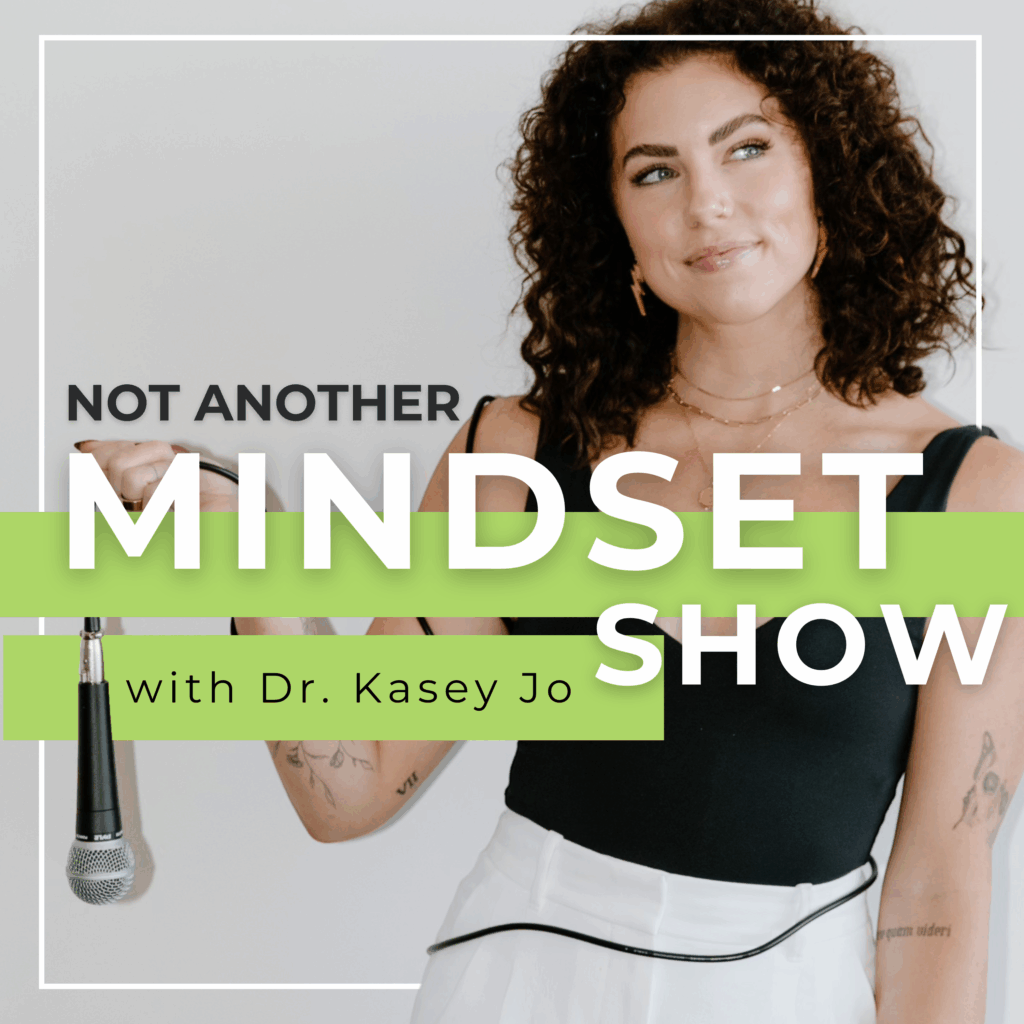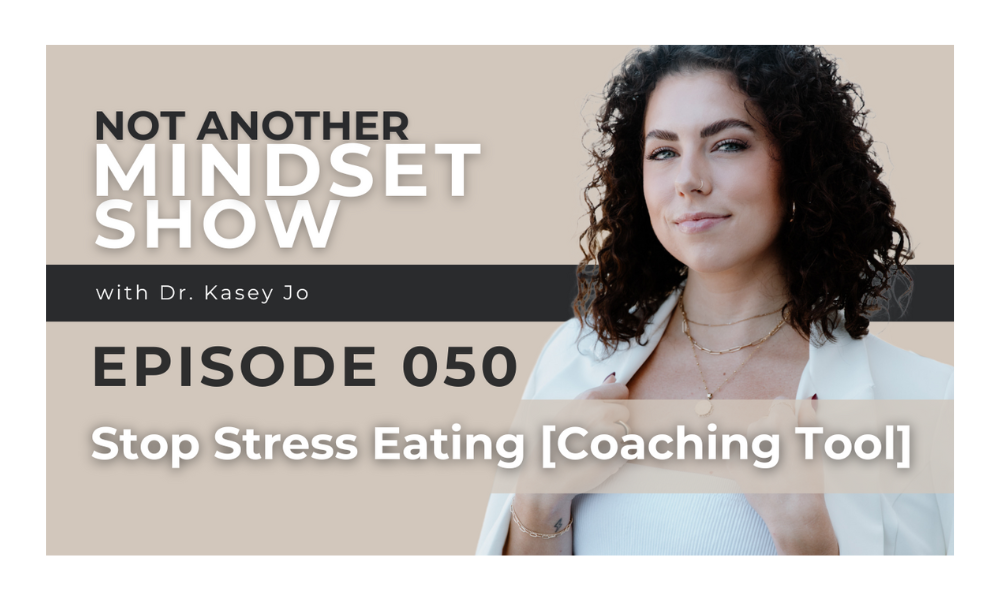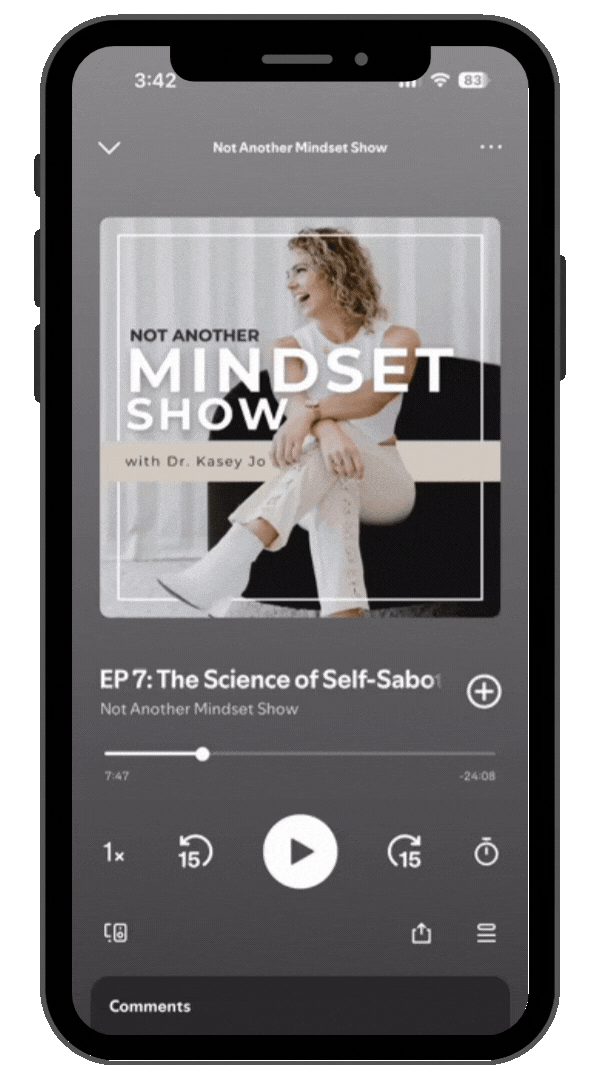Help your clients put an end to stress eating and create better habits.
If you feel like you always have some clients that just keep self-sabotaging and can’t stick to the plan, no matter what you try, you’ll want to get your hands on my 5 FREE lessons in behavior change and mindset. These lessons will help you coach your clients to overcome all-or-nothing thinking and fixed mindsets, stop getting in their own way, develop more self-control, and increase motivation and follow-through.
Learn the best way to put an end to stress eating and break other negative habits.
In this episode, I’m sharing the strategy I teach in the Health Mindset Coaching Certification to help clients break bad habits and overcome struggles like emotional eating. This evidence-based tool can help you and your clients achieve desired behaviors more easily.
Episode Highlights
>>(2:04) Introducing implementation intentions — the coaching tool that will help you and your clients overcome undesirable habits.
>>(7:32) Research study on the effectiveness of implementation intentions to decrease unhealthy snacking during times of stress and increase healthy snacking instead.
>>(13:39) Applying the research findings to your client’s eating habits to reduce stress eating and encourage healthy eating.
Listen to the full episode for more insight on breaking undesired habits like stress eating and helping your clients create more healthy habits in their lives.
Click here to listen!
Rate, review, and subscribe to my podcast.
If you enjoyed this episode, I’d be incredibly grateful if you could rate and review the show on your favorite platform. Your feedback helps me improve and allows others to discover the show. I want to hear from you whether you’re loving the insights or have suggestions on how I can make the show even better!
Simply scroll down to the review section on Apple Podcasts, Spotify, or wherever you listen, and leave your thoughts. Your support means the world to me and helps me continue to bring you more of the content you enjoy.
Links From the Podcast
Want me to answer your questions on my next Q&A episode? Drop your questions here!
Health Mindset Coaching Certification Instagram
Getting started with the Health Mindset Coaching Certification (5 FREE lessons included!)
Sleepy Girl Mocktail Products (mentioned in episode)
Rituals THC Beverage (code KJO15 for 15% off)
Sources for this episode
O’Connor, D. B., Armitage, C. J., & Ferguson, E. (2015)
Episode’s Full Transcript
Hello my friends, and welcome back to not another Mindset show. I’m your host, Dr. Kasey Jo. My goal with this podcast is to take the science of mindset and behavior change and distill it down into actionable takeaways for you. Together we’re gonna unpack research around motivations, self-sabotage, willpower, and so much more, and we’re going to take all of that and translate it into strategies you can immediately apply to your health fitness.
Relationships, business, marketing clients, all of the things. But just to be clear, it’s not all serious and Sy around here. We’re gonna have a ton of fun too, and I’m so excited to share all of this with you. All right, let’s go ahead and get into the episode. Hello, hello and welcome back Today we are.
Doing an episode that is very much so built upon last week’s episode. So I would really highly encourage you go listen to the previous episode before you listen to this one, just so you have a little bit more context for what we’re talking about. What we were talking about today is a specific tool. To help you or help your clients combat stressful snacking.
So in the previous episode, I went through sort of just very basics of emotional eating and stress eating. So today I wanna give you a specific tool. There are some tools, ideas, questions, that sort of thing in the previous episode as well. So that said. If you’re tuning in right now and you’re like, Casey, I don’t have time to go back and watch the other one.
It’s okay. You’re still gonna get plenty out of this episode. I am just a very strong proponent of understanding the underlying mechanisms and what is actually going on with our clients prior to. Just implementing the tips and tricks and hacks and all the fun stuff and tools, which is what we’re talking about today.
So this specific tool that I’m going to share is based on something called implementation intentions. Again, I. Fancy research term that people don’t really use. The, the more lay person term and just easier term, better term, honestly, is if then planning and with if then planning. What we are trying to do is essentially help our clients, help ourselves.
You can definitely use this with yourself to attach a specific action, which is the then. Part of if then to a certain situation, which is the if so, if this happens, then I do that. So that’s the very, very, very basics of implementation intentions. And if then planning, this is probably. Just based on feedback and how often students are talking about it.
Probably the most favorite tool that I teach inside the Health Mindset Coaching Certification. So this is just one of many, many, many, many, many tools that we go through in the certification that Health Mindset certified coaches are equipped with. So that said, how I’m talking about implementation intentions today, if then planning is from a specific study.
None of you are probably surprised that I pulled this from a research article, but when I came across it, I was like, oh my God, this needs to get into the hands of coaches. And I actually shared this research paper originally with our HMCC alumni members. So we have an alumni group that you can join after you become a health Mindset certified coach.
And I will often share just, Hey, I found this paper, or I found this research and I wanna tell you about it, and how you can apply it to your coaching now that you have the foundational knowledge. When it comes to mindset and behavior change, so the study that I’m talking about today, the purpose was to investigate the.
Effectiveness of a stress management support tool and the goal that they were looking for, the outcomes that they were looking for were to reduce stress induced, reduced stress induced snacking, and also increase. Healthy snacking during times of stress. So we’re not just talking about getting rid of the habit that so many of our clients have, where they’re heading to the pantry, opening up the fridge when they’re stressed out, and trying to mask those feelings, trying to distract themselves, which again is a lot of what I talked about in the previous episode.
Sort of the causes of stress induced eating and what we’re doing here, what we’re doing here, what the researchers, researchers did here was not. They didn’t just have the goal to reduce the stress induced unhealthy snacking, but also how can we make it healthier? So when it comes to habit formation, habit breaking habits in general, this is actually a very effective strategy, just generally, that instead of.
Just by itself trying to eliminate the unhealthy habit that we’re actually replacing it with a healthier habit. I mean, you see this all the time with things like smoking cessation or trying to reduce drinking, and instead of just kind of cutting it all, cold Turkey, number one, you’re. Trying to pair it back first and then what can you replace it with?
So if you’re trying to cut back on drinking, you might be ordering mocktails at dinner because you still want to have a drink in your hand. You wanna have a tasty something, right? Or at the end of the day, if you’re trying to stop reaching for a glass of wine, you may do something that I do and create a sleepy girl mocktail.
Um. Kind of varies on what that recipe looks like. I usually use, there’s a brand called, this is not what you guys are here for, but you know, fun. Additional benefit of this podcast episode is a Sleepy girl mocktail recipe I use. These drinks from recess, that’s the brand and they’re, they have magnesium in them and a couple other ingredients taste great, lightly carbonated.
I get the Strawberry Rose flavor, literally have an Amazon subscription to this drink. So I will have that as sort of the base and then either add, either or add both of them. Um, there’s a brand called Apothecary with a K Apothic. K Kerry and they have some tinctures that I really like and I put droppers of the, the liquid into that drink that kind of has like a red wine flavor to it, but has some ingredients like L-theanine and elderberry.
Other things that can just like support relaxation and or my friend Kaylin actually owns a, essentially like a spirit free. Drink that is THC. So it’s, you can kind of, um, what’s the word I’m looking for here? You can decide how much you want to use of it. So I’ll just throw a little bit of that in there.
Again, just relaxation, sleep supported. Um, yeah, I’ll throw links to all of these things. This is obviously not the purpose, but I see. This is why I love podcasts though. ’cause I’m like, oh, I just think of these things and I wanna share it with you and tell you about it. So I’ll make sure there’s links to all the stuff that I just talked about.
So if you’re like, oh. I need that in my life, which I think you probably do. So I’ll make sure all of that is in the description of the podcast too. But let’s get on it. Let’s get on with it rather. The study that I want to tell you about. So as I mentioned, the purpose was to investigate the, the effectiveness of this stress management support tool in order to decrease unhealthy snacking during times of stress and increasing healthy snacking instead.
So there were. Let me get these notes pulled up here so I make sure I do the study Justice. 219 people participated in the study, so we’re looking at 219 people total, and it was a seven day randomized controlled trial. Within those seven days, those people were split into two separate groups. One was a control group and one was a experimental group.
So both groups, both groups for seven days were doing daily diary type of tracking of their. There’re stressors and hassles that they experience throughout the day. So everyone was already doing that. And if you listened to the previous episode, you know that it can be really helpful to even just do that part, to have your clients, to have yourself really track what those daily stressors are.
And then also, obviously what we’re talking about here is pay attention to when those stressors lead you to want to snack. So that’s essentially what both groups were doing, all 219 people in the study were doing. The difference between these two groups is that the experimental group was asked to complete one additional task, and that one additional task is the specific tool that I’m going to talk about with you guys today.
So what that tool looked like, that half of the group, the experimental group did, they were asked to write down their stressors in a column. So take the things that stress them out on a daily basis in a column, and then in a column next to it, write down healthy snacks that they enjoy. Then they were asked to draw a line, like physically draw a line, take a pen, pencil, whatever, and draw a line connecting the stressors to the healthy snacks, while also visualizing themselves making that better choice during stressful situations.
So you can kind of picture this, they have, they’re sitting down. I have a piece of paper, I’m writing down my stressors in one column. I’m writing down my healthy snacks in another. And then as I’m connecting the stressor to a specific healthy snack, I’m thinking about how I’m feeling during that time of stress and then what it would look like for me to go grab a healthy snack during that time.
So I also have like the specific verbatim instructions that I wanted to read to you guys. So research has shown. This is a, a quote from the researchers. Research has shown that plans will be most effective when you picture the specific stressful situation in your mind and link each stressful situation with your healthy snack choice.
So this is what they’re telling the people in the study. Therefore, please draw a line linking each stressful situation and healthy snack choice and visualize yourself acting out each of your plans to eat healthier when you’re stressed. So that’s what the people in the experimental group were told. So again, as a reminder, all participants were still completing that seven day daily diary part of tracking their stressors and their snacking behaviors.
During the experiment and then following the experiment, that’s where we start to see some of these results. So let’s get into the results of this study. What the researchers found daily stressors were significantly and positively associated with unhealthy snacking, but not unhealthy snacks in the entire sample.
So what this means is, regardless of what group. The participants were in inside the study, they all saw a positive association with more unhealthy snacking and not healthy snacking during that daily diary tracking period. But what we see in the week after the study is very interesting. Those who completed the experimental portion of the study, so they used that tool that I just just described where they were connecting the stressors to healthy snacks and visualizing themselves actually doing it.
Their experience of daily stressors were not associated with unhealthy snacking for those in the control condition. Who didn’t use that specific tool? They were significantly more likely to unhealthy snack. To snack unhealthfully. So that was during that week after the study, which means essentially the experiment worked.
So there’s another piece of this that is really interesting that researchers pulled, they found that motivation to eat healthy. Plays a really big role. So people who were highly motivated to eat healthy, they’re reporting this about themselves and they were part of that experimental condition that used that specific tool.
They consumed more healthy snacks during the time compared to anybody else, and those high motivation participants ate three and a half. More healthy snacks per day on average compared to others. Whereas people who were reporting themselves to be low in motivation to eat healthy, eat two and a half, snacks on stress, two and a half healthy snacks on healthy on stressful days, geez words, my goodness.
So yeah, we’re seeing the difference in motivation being one healthy snack. But regardless of motivation, the experiment did work to reduce unhealthy snacking, but those who saw the best results, they had more healthy snacks. They didn’t just just reduce the unhealthy snacking, were those who also stated that they have high levels of motivation to eat healthy.
So. What does this mean for you if you’re a health and fitness coach? If you’re helping people reduce their unhealthy snacking and eat healthier, and specifically if it’s becoming an issue during times of stress for your clients, this if then planning process can be really helpful. So we want to be working to see how can we help our clients better connect.
Specific situations in their lives. Like you don’t wanna be the one to say, okay, during this time of stress and this time of stress, what are you going to do instead? You want them to be able to give you that information because ultimately you don’t really exactly know what the daily stressors and hassles are that each specific client is facing and how that’s impacting their eating behaviors.
So with if then planning, the purpose is to anticipate situations that are. Likely to hinder progress ahead of time and create, whether it’s if then statements. If this happens, then I will do that. Or you could get a little bit fancier and have them do something like this. Uh, that was described in the study where they have the two different columns.
One column being the situation and the other column being the thing that they’re going to do during that situation. What this allows us to do is essentially rehearse. In a way we’re planning ahead for those specific situations and it’s one thing to say, oh, like what’s gonna be difficult for you this weekend?
And like, let’s talk about it. It’s another thing to say, what specifically is going to come up for you this weekend, and what is a specific action we can do in that situation? And of course, based on these study results, motivation matters too. So ask your clients how motivated they actually feel to eat healthy.
I know that seems like such a basic question, but how often are we, I. Asking that versus just making the assumption. And maybe even have them do that on a scale of one to 10, and then ask them why they chose that number. If they said, oh yeah, I definitely like an eight out of 10. That sounds pretty good.
But then also asking them, well, why aren’t we a nine or a 10? Or, what would it take to get you to a nine or a 10? And on the flip side. Why aren’t you a seven? And I love that question specifically because we’re getting to help our clients recognize why they aren’t less motivated, which I know sounds kind of counterintuitive.
Why do we want to focus on why they aren’t unmotivated? Because when they get into that though, they’ll explain to you the reasons why they are motivated and the more we can have our clients. Express to us, express to themselves that they are motivated, they’re interested in doing this. All of the reasons why they’re motivated to eat healthy the better.
So I really like keeping motivation in mind here. And I would argue that mindset is also connected here too. Do they actually. Believe that they can become healthy eaters? Do they believe that in times of stress there are other options for them and they can successfully choose that other option? Because ultimately, if they don’t actually believe that they can make these changes in the first place, you’re gonna keep running into roadblocks.
So motivation matters. Their belief about their motivation, their belief about their ability to make these changes is a huge, huge component. I actually would’ve really loved to see if this study didn’t just ask about motivation, but also asked about their personal beliefs and their abilities to change these things and what we would’ve seen in the results then.
But, okay, so I’m leaving you there. Super quick and dirty episode this time with that specific tool. So I hope this was really helpful. Please let me know, reach out on Instagram, leave a review. By the way, if you leave a review and you screenshot that review and throw it into our review form, which is linked in the description of this episode, then you are entered to win one of my workshops for free.
So don’t forget to do that, and I appreciate it so much. It helps me. Understand what it is you guys are looking for. It helps the podcast get out in front of other people who need it. So I really, really appreciate your feedback. Always, your love, your criticisms, whatever you have for me, send it over. I’m always there for you on Instagram.
If you have any follow up questions or anything like that, I love chatting with you guys after you listen to an episode. It’s so fun for me. So, okay, that’s all I have for you today. I hope this was helpful, and I’ll see you next time. And that’s a wrap for today’s episode of Not another Mindset show. If you enjoyed today’s episode, don’t forget to hit that subscribe button so you get notified of the next one.
Because if you’re anything like me, if the episodes aren’t popping up for you automatically, you’ll keep forgetting to come back to the show even if you really, really enjoyed it. So go ahead and hit that subscribe button and make it super easy for you and of course. If you wanna see more episodes just like this one, I’d love for you to let me know by leaving a review.
I know, I know it’s super annoying to do, but the few seconds that it takes means the world to me and also ensures that I can keep providing free education and value to you. And just to sweeten the deal, I am going to be picking a random reviewer every single month to receive a free workshop or product from me.
If you’re looking for more free resources or just wanna connect, hang out, chat a little bit, come find me on Instagram. I’m Coach Casey, Joe over there. That is where I hang out the most in the land of social media. Alright, my friends, that is all I have for you this time. I so appreciate you being here and love to see you prioritizing your growth.
I’ll see you next time.




